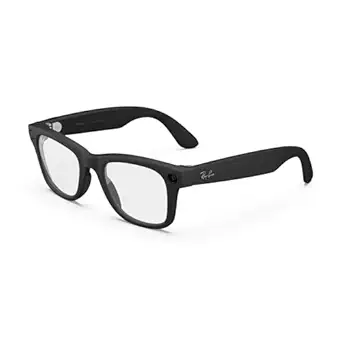It is a general perception these days that Meta has leap-frogged ahead of nearly everyone else in the head-mounted wearables segment, leaving Apple to play a laborious catch-up. While one analyst from Oppenheimer now maintains that Meta's growing prowess in the smart glasses sphere is not a threat to Apple just yet, doubts continue to persist as to the overall viability of Apple's ambitions.
Meta Connect 2025: All-New Ray-Ban Smart Glasses With In-Built Display And A Wristband Controller, Ray-Ban Meta Gen 2, And Oakley Meta Vanguard AI Glasses

Meta's all-new Ray-Ban Display smart glasses were, inarguably, the star attraction at this week's Connect 2025 conference, featuring an in-built display that is large enough to read text, watch a small video, view directions, and see live translations. At 42 pixels per degree (ppd), the display offers higher resolution than any of Meta's other consumer VR headsets.
Additionally, with a custom light engine and waveguide delivering brightness up to 5,000 nits, Meta claims the glasses work great both indoors and outdoors. Meta Ray-Ban Display will be available for purchase starting September 30 for $799, replete with the Meta Neural Band, which contains the control interface for the smart glasses. This allows users to navigate apps with hand gestures by leveraging electromyography (EMG) to pick up on signals sent between the brain and the hand.

Meta has also unveiled the second generation of its now-iconic Ray-Ban Meta smart glasses (sans in-built display) with 2x the battery life, offering up to eight hours of mixed use, 2 hours of continuous 'live AI' support, and ultra HD 3K video recording ability. The smart glasses will soon support a bespoke noise cancellation system, called conversation focus.

Finally, the company unveiled the Vanguard variant of its athletics-focused Oakley smart AI glasses, which work with Garmin smartwatches and cycling computers to give real-time insights and alerts. The glasses also support 3K UHD video recording via a 12 MP camera.
Oppenheimer Analyst: "Apple Wearables Ecosystem Safe from Meta New Glasses Encroachment"
Oppenheimer analyst Martin Yang has just penned an interesting note, arguing that Meta's evolving wearables ecosystem does not constitute a threat to Apple ecosystem around iPhone, AirPods, and Apple Watch just yet.
Yang, after discussing the Ray-Ban Display's specifications with his supply chain contacts, asserts that Meta "is not offering an SDK for third-party developers to build dedicated apps for the hardware. For now, the device will be most useful when paired to a smartphone, running both Meta's 1P apps and presenting information from third-party apps (music, messaging) on smartphones."
While an attractive new addition to Meta's catalogue of smart glasses, the Ray-Ban Display is less capable than the Orion smart glasses featured in Meta's Connect 2024 conference, with support for augmented reality lenses and eye tracking. Of course, it would likely take Meta years to produce a commercially viable Orion-branded offering.
Yang notes that the Ray-Ban Display uses "less proprietary parts for its light engine, such as LCoS microdisplay from Omnivision and reflective waveguide from Lumus. This is quite different from Orion, where more proprietary parts, materials, and processes were involved." Moreover, according to the analyst, Ray-Ban Display's weight of around 67 grams would prove to be uncomfortable for most wearers.
As such, the Oppenheimer analyst expects Ray-Ban Display to entail a sales volume of between 150,000 and 200,000 units over the next two years, which is certainly not sufficient to categorize the device as mainstream. Yet, the analyst ignores one critical point in giving an all-clear signal to Apple: instead of trying to compete, Apple abandoned its Mac-connected AR glasses project in the aftermath of the Orion unveil by Meta.
Moreover, the Apple Vision Pro, priced at an eye-watering $3,499, is a non-starter in terms of any viable challenge to Meta's ascendancy. What's to stop Apple from abandoning its Vision Pro project further down the road if Meta's enviable progression continues?
As of early 2025, Apple had managed to sell just around 500,000 units of the Vision Pro headset, as most potential users were apparently put off by its price tag and the lack of compelling use-cases, especially as Apple has struggled to build an expansive app ecosystem around its signature AR headset. The headset's bulky design and external battery pack add other pain points as well.
Given the lack of viable competition from Apple, we would politely disagree with the conclusion drawn by the Oppenheimer analyst, and argue that Apple's ecosystem remains very much in play, and under threat from Meta's encroachment.
Follow Wccftech on Google to get more of our news coverage in your feeds.










